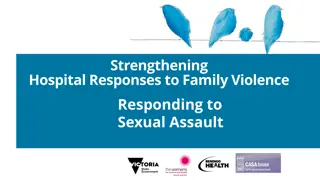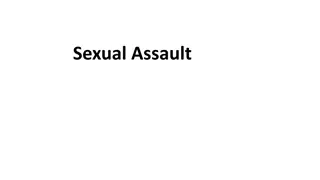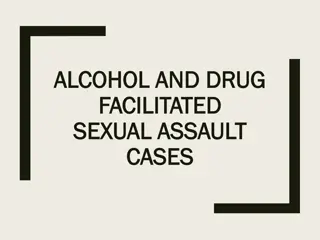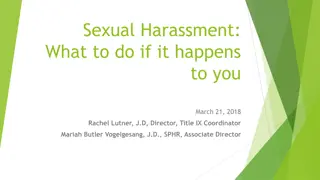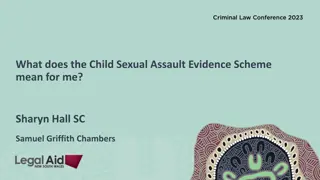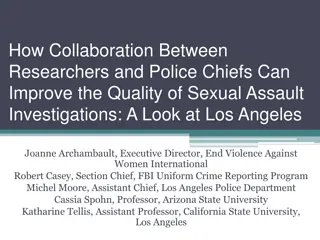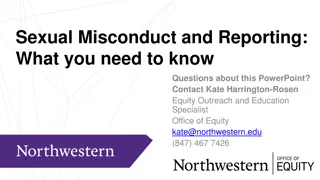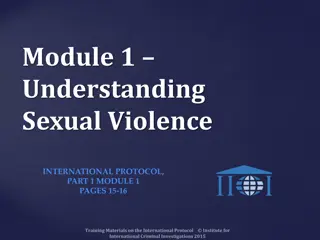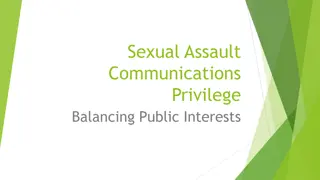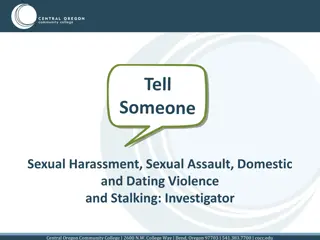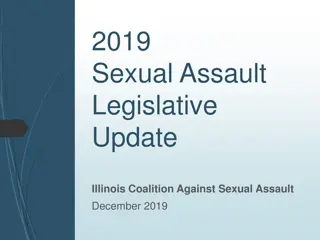Understanding Sexual Assault: Important Information and Resources
Comprehensive information covering different degrees of sexual assault, types such as acquaintance rape and domestic violence, potential aftermath like PTSD and substance abuse, the importance of receiving medical attention, preserving DNA evidence, and collecting forensic evidence in cases of sexual assault.
Download Presentation

Please find below an Image/Link to download the presentation.
The content on the website is provided AS IS for your information and personal use only. It may not be sold, licensed, or shared on other websites without obtaining consent from the author. Download presentation by click this link. If you encounter any issues during the download, it is possible that the publisher has removed the file from their server.
E N D
Presentation Transcript
Sexual Assault First Degree Any person who subjects another person to sexual penetration (a) without the consent of the victim, (b) who knew or should have known that the victim was mentally or physically incapable of resisting or appraising the nature of his or her conduct, or (c) when the actor is nineteen years of age or older and the victim is at least twelve but less than sixteen years of age is guilty of sexual assault in the first degree. Sexual Assault Second Degree Any person who subjects another person to sexual contact (a) without consent of the victim, or (b) Who knew or should have known that the victim was physically or mentally incapable of resisting or appraising the nature of his or her conduct is guilty of sexual assault in either the second degree or third degree. Sexual Assault shall be in the second degree if the actor shall have caused serious personal injury to victim. Sexual Assault Third Degree Any person who subjects another person to sexual contact (a) without consent of the victim, or (b) Who knew or should have known that the victim was physically or mentally incapable of resisting or appraising the nature of his or her conduct is guilty of sexual assault in either the second degree or third degree. Sexual Assault shall be in the third degree if the actor shall not have caused serious personal injury to the victim.
Acquaintance Rape Dating and Domestic Violence Drug Facilitated Sexual Violence Stranger Rape
Post Traumatic Stress Disorder Substance Abuse Self-Harm / Self-Injury Depression Sexually Transmitted Infections Pregnancy Sleep Disorders Eating Disorders Suicide
Receiving Medical Attention It is vital for a victim of sexual assault to receive medical attention, regardless of his or her decision to report the crime to the police. For the victim s health and self-protection, it is important to be checked and treated for possible injuries, even if none are visible.
Importance of DNA Preserving DNA evidence is a key tool for law enforcement s investigation and prosecution of a sexual assault case.
Preserving & Collecting Forensic Evidence A forensic medical exam may be performed at a hospital or other healthcare facility, Family Advocacy Network (FAN), by a sexual assault nurse examiner (SANE), sexual assault forensic examiner (SAFE) or another medical professional.
FAN Services include: Forensic Interviews Forensic Medical Examinations Hair Follicle Testing Referral/Advocacy Services Training for our Multidisciplinary Teams
To provide centralized access to an integrated system of services for victims of abuse. To provide coordination of high quality, reliable, timely, consistent psychosocial history and assessment interviews and forensic medical examinations. To provide an increased coordination of efforts toward prevention, identification, treatment and prosecution of abuse.
4.Lie. If you dont want to hurt the persons feelings it is better to lie and make up a reason to leave than to stay and be uncomfortable, scared, or worse. Some excuses you could use are: needing to take care of a friend or family member, not feeling well, having somewhere else that you need to be, etc. 5.Try to think of an escape route. How would you try to get out of the room? Where are the doors? Windows? Are there people around who might be able to help you? Is there an emergency phone nearby? 6.If you and/or the other person have been drinking, you can say that you would rather wait until you both have your full judgment before doing anything you may regret later.
Avoid Dangerous Situations Be aware of your surroundings. Knowing where you are and who is around you may help you to find a way to get out of a bad situation. Try to avoid isolated areas. It is more difficult to get help if no one is around. Walk with purpose. Even if you don t know where you are going, act like you do. If uncomfortable, UNKPD does offer the SAFEWALK PROGRAM. Trust your instincts. If a situation or location feels unsafe or uncomfortable, it probably isn t the best place to be. Try not to load yourself down with packages or bags as this can make you appear more vulnerable. Make sure your cell phone is with you and charged and that you have cab money. Don't allow yourself to be isolated with someone you don t trust or someone you don t know. Avoid putting music headphones in both ears so that you can be more aware of your surroundings, especially if you are walking alone.
Change the locks on doors and windows Keep windows and doors locked, even when you are at home Select an apartment with a security system Install outside lighting system (with motion detectors) Do not prop doors or windows Close blinds/curtains at night Keep car doors locked, even in your own driveway or garage
Be aware of rape drugs (#1 date rape Drug = ALCOHOL) Try not to leave your drink unattended Only drink from un-opened containers or from drinks you have watched being made and poured Avoid group drinks like punch bowls Cover your drink. It is easy to slip in a small pill even while you are holding your drink. Hold a cup with your hand over the top, or choose drinks that are contained in a bottle and keep your thumb over the nozzle If you feel extremely tired or drunk for no apparent reason, you may have been drugged. Find your friends and ask them to leave with you as soon as possible If you suspect you have been drugged, go to a hospital and ask to be tested Keep track of how many drinks you have had Try to come and leave with a group of people you trust Avoid giving out your personal information (phone number, where you live, etc.). If someone asks for your number, take his/her number instead of giving out yours
Make sure your cell phone is easily accessible and fully charged Be familiar where emergency phones are located on the campus Be aware of open buildings where you can use a phone Take major, public paths rather than less populated shortcuts Avoid dimly lit places and talk to campus services if lights need to be installed in an area Avoid putting music headphones in both ears so that you can be more aware of your surroundings, especially if you are walking alone. Walking back from the library very late at night is sometimes unavoidable, so try to walk with a friend, or contact UNKPD for a SAFEWALK Carry a noisemaker (like a whistle) on your keychain Carry a small flashlight on your keychain If you feel uncomfortable walking on campus, call UNKPD. UNK does have 10 emergency phones throughout campus, along with the SAFEWALK PROGRAM.
Lock your door when you go to sleep and when you are not in the room Keep your window locked (especially if it is easy to enter from the ground) If people constantly prop open the main dorm door, talk to an authority about it If your dorm has an elevator, try to stay near the button dashboard when are you riding in it so that you have easy access to the emergency button. Also, if you feel threatened, you can push the button for the next floor and leave immediately instead of waiting for the elevator to reach the floor where you live Avoid isolated areas (stairways, laundry rooms, basement, etc.) when you are alone
Use the resources that your campus offers! UNK currently provides the SafeWalk Program, Ten Emergency Phones, R.A.D. (Rape Aggression Defense) training, 24 hour Police and Counseling Services, along with an active S.A.R.T. (Sexual Assault Response Team).
About Victims 44% of victims are under age 18 80% are under age 30 Sexual Assault Numbers Every 2 minutes, someone in the U.S. is sexually assaulted There is an average of 207,754 victims (age 12 or older) of sexual assault each year Reporting to Police 54% of sexual assaults are not reported to the police 97% of rapists will never spend a day in jail About Rapists Approximately 2/3 of assaults are committed by someone known to the victim 38% of rapists are a friend or acquaintance
UNKPD 308-627-4811 (24hr cell) UNKPD 308-865-8517 (office) Safe Walk 308-224-0853 or 308-236-2488 Counseling 308-865-8248 (office hours) 308-224-4956 (after hours, urgent) Anonymous Reporting http://www.unk.edu/offices/Police/UNK_Silent_Witness/
Buffalo Co. Sheriffs Dept. 308-236-8555 Kearney Police Dept. Crime Stoppers SAFE Center 308-237-2599 Buddy System/Kearney Cab 308-234-6725 308-237-2104 308-237-3424 911
https://www.facebook.com/pages/UNK- Police-and-Parking- Services/279119592231327





